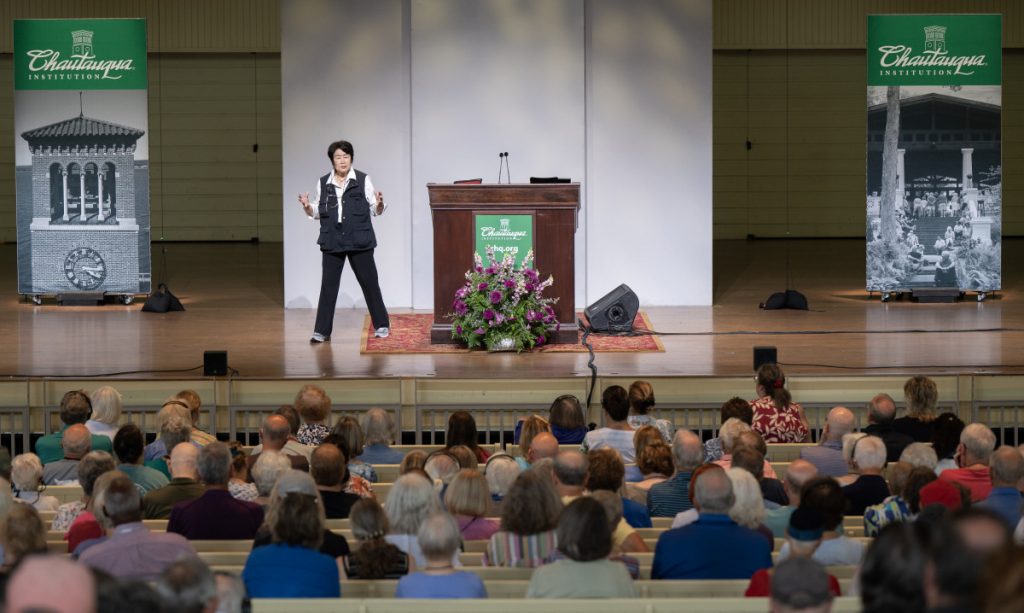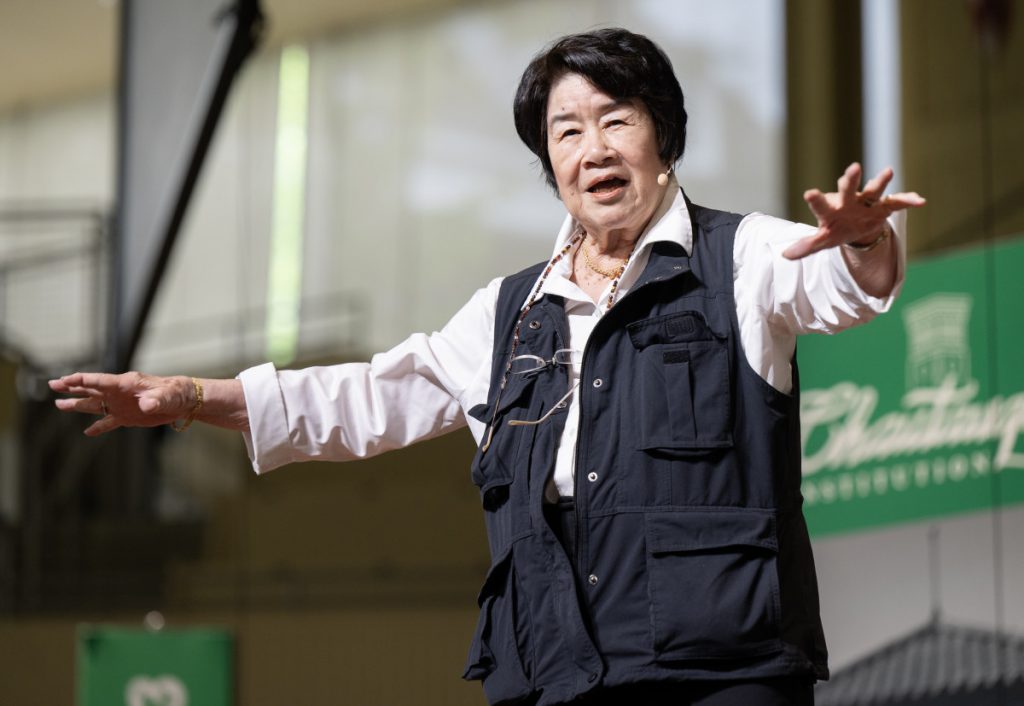
Kaitlyn Finchler
Staff writer
Points on a compass can be easily defined as geographical: North, South, East and West. When referring to the Global South, it’s not so much a region as it is a dialogue of underrepresented countries — according to Molly Williamson, who served as a foreign service officer for six U.S. presidents and is currently a non-resident Scholar at the Middle East Institute..
Williamson delivered her lecture, “Challenges We Have to Share,” at 10:45 a.m. Monday in the Amphitheater, opening Week Nine of the Chautauqua Lecture Series, “The Global South: Expanding the Scope of Geopolitical Understanding.”
She started with the origins of the term “Global South” — the period immediately following World War II — and clarifying the confusion surrounding the definition.
“It’s the sense of the world, that frustration with just how much the other guy might be doing or devoting to the contest of building camps or spheres of influence,” Williamson said. “In 1950, the large majority of countries felt they were being manipulated (or) pressured by Moscow and Washington to side with them against the other.”
Calling themselves the “non-aligned movement,” she said, both Washington and Moscow wanted to make it clear they were independent — embracing the principles of the United Nations, rejecting the humiliation of colonialism and celebrating self-determination and independence.
By 1970, the North and South dialogue “became ever more prevalent,” but it was not about geography. The assumption, Williamson said, was that countries in the North were industrialized and developed, while the Southern hemisphere was more “needy” and not as accomplished.
The focus, she said, became the countries asking, “Are we being paid attention to as legitimate, independent actors, countries of growth, dynamic interests (and) things to offer the world?”
East and West is the “old” dialogue, enter the new: North and South. Whatever concerns or confusion exist, this new dialogue is a good thing.
“No matter how concerned we are, no matter how vulnerable we feel about our society, culture, economy (or) nation, there is no other country richer than the United States,” she said. “There is no other country as powerful as the United States so far.”
The good part, she said, whether Americans like it or not, has put the United States “in the spotlight” of attention to priorities and needs of emerging economies and development.
The most recent example of shifting priorities of the North and South is the Russian invasion of Ukraine 18 months ago, and “the reluctance” of a large number of United Nations countries to condemn the unprovoked invasion.
“As we looked at the Western leaders being very concerned that the Russian behavior was totally disrupting the stability of Europe,” she said, “the countries of the South were saying, ‘Hang on, we are not willing to be attached to a Western, so-to-speak, condemnation of Russia.’ ”

These “developing” countries need Russian oil and wheat, Williamson said, so they are less likely to push for a global war against a nuclear state.
The main point, she said, is countries are urging to be recognized as independent and not lumped into one region. She framed her lecture with “baskets of issues,” that serve as global challenges for everyone, as a planet, to address.
The first basket: people. With a population of over 8 billion, she said, and an expected 9 billion by the middle of the century, the world is growing, but aging.
“If you want to see what the demographers call the ‘demographic dividend,’ namely that now you have a lot of people in the labor force, they can produce a lot,” Williamson said. “They will be top manufacturers and the economy will flourish. If you really want to do that, then you have to invest in the people.”
This is where the problems are, she said, because so many economies can’t afford to, or have governments who won’t, invest in the labor force.
“There is a risk that young people will see themselves without options, will see themselves without futures, and they will be unhappy,” Williamson said. “The more unhappy they are, the more bereft of opportunities and options they think they have, the more likely there will be instability.”
The one primary goal of any government, she said, is to “be here tomorrow,” and anything that endangers this is an existential threat.
“If people don’t feel they have opportunities, they are more likely to look elsewhere for where the money is (and) where the jobs are right now,” Williamson said. “Now, we have a problem of migration.”
Migration, in Williamson’s context, is not in terms of refugees seeking asylum, but how the receiving countries will react to the increase of foreign presence.
“Their citizenry ranks (will be) added, so that’s more demand for services, infrastructure (and) a challenge to existing order,” Williamson said. “There won’t be enough jobs, schools or places in the hospital for everybody.”
The aging populations, she said, are well-educated and have already contributed substantially to the productivity of their countries. However, they’re retiring, which calls for a larger need for services, resources and benefits.
“There are only so many variables we have to work with,” Williamson said. “Simultaneously, both phenomena are occurring. The ‘people issue’ is one that has to be addressed, and nobody is able to do so. This is one of the most elusive topics for any government.”
The United States has twice as many job openings as people searching for jobs. Williamson said this is a serious gap, with a huge skill gap, and the focus needs to be on teaching and creating new trade workers.
The second basket is the “double-edged sword” of providing energy security while promoting environmental responsibility. Williamson said oil is the single-most energy-dense material, and using coal should be eliminated, as it produces 25% more greenhouse gasses than oil.
“We have to use the existing structure,” she said. “(The energy) industry is the single-largest industry on the planet in dollar terms. The single-largest (industry) in, people terms, is agriculture.”
The top three oil-producing countries are the United States, Saudi Arabia and Russia, leading Williamson to ask facetiously, “What could go wrong?”
If fossil fuels are eliminated right now, she said, there’s no replacement. There needs to be a proper resolution before “coming off of” fossil fuels, which comprise more than 80% of the planet’s fuel mix.
“The center of gravity for consuming fuel of all kinds — and for polluting the Earth’s atmosphere — is shifting from North to South,” Williamson said. “It’s true that the industrialized nations, who have been the richest countries for the last 150 years, have disproportionately consumed the Earth’s energy resources and polluted the Earth’s atmosphere.”
The challenges, she said, are enormous. Eight billion people consume about 40% of the Earth’s fossil fuels and produce around 37 to 38% of global greenhouse gasses. She said this has led 82% of the population to say, “Now it’s our turn, and you’re telling us no? You’re telling us we’re the problem?”
Williamson said the developed world will tell the developing world not to modernize their economies, and leave them behind.
“At a time when, with great financial stringencies, people with every effort try to modernize, grow and develop their countries to minimize stress and unrest,” she said, “the environmental responsibility ticket more dramatically divides the two sets of economies.”
China today has the world’s largest wind farms and solar electricity generation, she said, but China is more than 60% dependent on coal and electricity generation.
“China’s continuing to build one coal-fired electricity plant a week,” Williamson said. “They’re not building it to last a year, they’re building it to last 30 years. … Today, China has three times more than the rest of the world combined in coal consumption.”
On the other hand, India has said to “do whatever it has to do to bring its people to prosperity,” but use soft, dirty coal found abundantly in India. Williamson said it “isn’t a surprise” that 17 of the world’s 20 most-polluted cities are in India.
The third basket of issues is “everything else,” she said, from the COVID-19 pandemic to the Russian invasion of Ukraine to the hurricane in Pakistan.
“People can’t decide if they’re going to die first from COVID or starvation today because they’re not at work anymore,” Williamson said. “As if they could choose?”
Throughout the world, more and more votes are cast to nationalist, authoritarian and populist behaviors and regimes.
“We’re using tools that aren’t all of the merits of the issue to affect the merits of the issue,” she said. “The International Monetary Fund has reported that this will have lasting effects on the global economy, trying to throw sanctions (and tariffs) at everything.”
Williamson said the planet is on a “scary trajectory” toward diminishing resources, unless people treat the Global South with as much respect as they do the North.
“We have to do something we aren’t really good at,” she said. “We have to prove we know how to listen, as well as lecture. Listening is not our strong suit.”
To prove the United States can listen to the concerns of developing countries, Williamson said it needs to prioritize and embrace new opportunities and incorporate these three baskets of issues.
“Governments have to demonstrate that kind of flexibility in order to deal with changes we didn’t anticipate 10 (or 15) years ago,” she said. “Nobody expects that any government is going to be problem-free, no matter what form of government it may take.”
She ended on an observation by philosopher and baseball player Yogi Berra: “The future ain’t what it used to be.”




